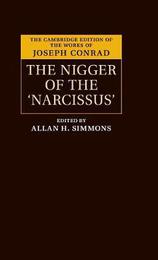
|
The Nigger of the 'Narcissus': A Tale of the Sea
Hardback
Main Details
Description
Charting a homeward-bound voyage from Bombay to London aboard a sailing ship, The Nigger of the 'Narcissus' (1897) captured the late-Victorian era's maritime obsession and identified the strikingly original talent of Joseph Conrad (1857-1924) as a sea writer in what has proved to be a landmark of sea literature. The Introduction situates the novel in Conrad's career and traces its origins and reception. Explanatory notes illuminate literary and historical references, identify real-life places and indicate Conrad's sources and influences. The essay on the text and the apparatus lay out the history of the work's composition and publication, and detail interventions by Conrad's typists, compositors and editors. Also included are notes explaining literary and historical references, a glossary of nautical terms, illustrations, including maps and pictures of early drafts, and appendixes. This edition of The Nigger of the 'Narcissus' presents the novel and its preface in forms more authoritative than any so far printed, and restores a text that has circulated in defective forms since its original publication.
Author Biography
Allan H. Simmons, Professor of English at St Mary's University, Twickenham, London, is the author of Joseph Conrad (2006) in Palgrave's Critical Issues series and Heart of Darkness: A Reader's Guide (2007). He has edited Conrad in Context (2009), Joseph Conrad: The Contemporary Reviews, Volume 1 (2012), a centennial edition of The Nigger of the 'Narcissus' (1997), and co-edited Lord Jim (2007) and The Nigger of the 'Narcissus' and Other Stories (2007). He is the General Editor of The Conradian: The Journal of the Joseph Conrad Society.
Reviews'The monumental new Cambridge edition of The Nigger of the 'Narcissus' meticulously traces his emendations to the text in its progress from manuscript to magazine and volume publication and is packed with contextual information - not least, a detailed exploration of its reception. As the editor Allan H. Simmons points out, far from being the farewell to things nautical that Conrad intended, the book marked his arrival as the definitive voice in maritime storytelling.' Elizabeth Lowry, The Times Literary Supplement
|